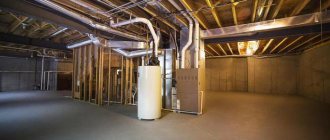Common areas in an apartment building are common property owned by the right of common shared ownership to the owners of the premises in the apartment building. Such premises include inter-apartment landings, stairs, elevators, corridors, technical floors, attics, basements in which there are utilities. Together with the acquisition of an apartment or non-residential premises, the owner automatically acquires a share in the right to the common property of an apartment building.
Most apartment owners understand that “taking over” part of the corridor or staircase to their apartment is illegal and requires many approvals. Whereas with regard to basements and attics, there is an opinion that they can easily be registered as property. This decision is made by the owners of the apartments at a general meeting, a protocol is drawn up where the residents distribute specific premises among themselves, for example in the basement, to formalize ownership.
But in this case, the owners of the premises for some reason forget the norm of the Housing Code, which states that the owners do not have the right to allocate in kind their share in the right of common ownership of common property in an apartment building.
Considering the increase in the number of incoming applications for state cadastral registration of premises formed from common areas in an apartment building, the Cadastral Chamber informs owners and cadastral engineers preparing technical plans for the purpose of registering these premises with the state as simply “non-residential”, that the registration authority in In this case, a decision is made to suspend state accounting.
In accordance with the Housing Code, reducing the size of common property in an apartment building is possible only with the consent of all owners of premises in this building through its reconstruction. A document certifying the completion of reconstruction of a capital construction project in full in accordance with the construction permit and design documentation is a permit to put the facility into operation. Thus, only through a permit to put an object into operation (in fact, a permit for the reconstruction of an apartment building), it is possible to classify common areas in an apartment building into the category of “non-residential premises” subject to state cadastral registration and subsequent registration of rights
How is common property in an apartment building managed?
Lawyer Antonov A.P.
In accordance with Art. 209 of the Civil Code of the Russian Federation, the owner has the rights to own, use and dispose of his property. The owner has the right, at his own discretion, to take any actions in relation to his property that do not contradict the law and other legal acts and do not violate the rights and legally protected interests of other persons, including alienating his property into the ownership of other persons, transferring to them, while remaining the owner, the rights possession, use and disposal of property, pledge property and encumber it in other ways, dispose of it in any other way. The owners of apartments in an apartment building own, by right of common shared ownership, the common premises of the house, the load-bearing structures of the house, mechanical, electrical, sanitary and other equipment outside or inside the apartment that serves more than one apartment (clause 1 of Article 290 of the Civil Code of the Russian Federation). The list of common property in an apartment building belonging to the owners of premises in an apartment building on the right of common shared ownership is determined by Art. 36 of the Housing Code of the Russian Federation and clauses 2 - 9 of the Rules for the maintenance of common property in an apartment building, approved by Decree of the Government of the Russian Federation of August 13, 2006 N 491. By virtue of Part 2 of Art. 36 of the Housing Code of the Russian Federation, the owners of premises in an apartment building own, use and, within the limits established by the Housing Code of the Russian Federation and civil legislation, dispose of the common property in the apartment building. According to Art. 246 of the Civil Code of the Russian Federation, the disposal of property in shared ownership is carried out by agreement of all its participants. Provided for in Part 2 of Art. 36 of the RF Housing Code, the right of owners of premises in an apartment building to own, use and dispose of common property in an apartment building cannot be interpreted as allowing one owner to violate the same rights of other owners, and to oppose the interests of one owner to the interests of other owners (clause 23 of the Review of Judicial Practice Supreme Court of the Russian Federation No. 1 (2017), approved by the Presidium of the Supreme Court of the Russian Federation on February 16, 2017). Issues of disposing of the common property of an apartment building fall within the competence of the general meeting of owners of premises in an apartment building (Part 2 of Article 44 of the Housing Code of the Russian Federation). The Ruling of the Supreme Court of the Russian Federation dated October 29, 2018 N 307-ES18-16531 in case N A56-59412/2017 reflects the position according to which the decision on the procedure for use, disposal, collection of fees for the placement of objects on the common property of an apartment building and its size is documented in a protocol of the general meeting of owners of premises in an apartment building and is within its exclusive competence. Decisions of the general meeting of owners of premises in an apartment building on issues put to vote are adopted by a majority vote of the total number of votes of the owners of premises in an apartment building participating in this meeting or by a majority of at least two-thirds of the total number of votes of owners of premises in an apartment building, in depending on the content of the issue put to vote (Part 1 of Article 46 of the RF Housing Code). Decisions made by the general meeting of owners of premises in an apartment building, as well as voting results, are brought to the attention of the owners of premises in this building by the owner specified in Art. 45 of the Housing Code of the Russian Federation by another person, on whose initiative such a meeting was convened, by posting a corresponding message about this in the premises of this house, determined by the decision of the general meeting of owners of premises in this house and accessible to all owners of premises in this house, no later than ten days from the date of adoption of these decisions (Part 3 of Article 46 of the RF Housing Code). By decision of the owners of premises in an apartment building, adopted at a general meeting of such owners, common property in an apartment building can be transferred for use to other persons if this does not violate the rights and legitimate interests of citizens and legal entities (Part 4 of Article 36 Housing Complex of the Russian Federation). If a decision is made to provide the common property of an apartment building to a third party, the management body of the apartment building concludes a lease agreement with the third party in the manner established by the Civil Code of the Russian Federation. By virtue of clause 2 of Art. 651 of the Civil Code of the Russian Federation, a lease agreement for a building and structure concluded for a period of at least one year is subject to mandatory state registration.
Still have questions for your lawyer?
Ask them right now here, or call us by phone in Moscow +7 (499) 288-34-32 or in Samara +7 (846) 212-99-71 (24 hours a day), or come to our office for a consultation (by pre-registration)!
Possibility of privatization
Russian citizens living in municipal apartments under a social tenancy agreement, including in premises that are included in the housing stock of economic management organizations or operational departments, have the right to free privatization, if this opportunity has not been used before.
This process requires an agreed upon solution between residents. If any of them does not want to become a participant in privatization, he may not do so by writing a refusal. If children are registered and living in a communal non-privatized apartment, they must be included in the privatization agreement without fail. However, upon reaching the age of eighteen, they can independently once again, of their own free will, become participants in the privatization of other real estate for free.
According to the law, only isolated premises – rooms – can be privatized. It is impossible to transfer half of the room or kitchen into personal property. There is no need to obtain any consent from neighbors for privatization, as was the case before. After this, the owner has the right to do whatever he sees fit with the property or part of it.
Let me wash myself
The reason for this phenomenon is the ability to buy, sell, give and inherit square meters. A resident of the capital, living in a communal apartment, faced one of these communal problems. So, a woman in a three-room apartment had two rooms as her property. The third belonged to another lady. But the owner of one room had another place to live, and, having bought another room, never moved into it. But from the very first day I began to gain extra meters. From that moment on, communal hell began for the owner of two rooms who permanently lived in the apartment. Temporary residents used the bathroom, kitchen, hallway and other “common property.”
And they made life very difficult for the owner of everything that stood on this “common” territory. The fact is that the kitchen and bath remained indivisible between the owners of the communal apartment. And everything that was in the toilet and corridor belonged to the permanently living hostess. And temporary residents considered it unnecessary to buy hangers and kitchen utensils.
The tired owner of two rooms went to the district court with a claim to protect her civil rights and for compensation for moral damage. She wanted her permission to move in temporary residents. But the court refused her. The Judicial Collegium for Civil Cases of the Supreme Court, having checked the decisions of district and city colleagues, did not agree with them.
The district court, when it denied the plaintiff, proceeded from the fact that today’s legislation does not provide for such a limitation of the rights of the owner as the need to obtain the consent of the owners of other rooms to move strangers into their territory. And the “common property,” that is, the bathroom, kitchen and hallway, “follows the fate of ownership of the room.” The court referred to Articles 41 and 42 of the Housing Code. The Supreme Court did not agree with such conclusions.
The Supreme Court stated that the owner has the right to “provide temporary possession” of his residential premises to other citizens. But besides rights, he also has responsibilities. The owner of square meters is required by law to “observe the rights and interests of neighbors and the procedure for maintaining common property.”
According to the Housing Code (Article 41), the owner of a communal apartment owns, by right of common shared ownership, “premises in the apartment used for maintenance.” Simply put, it's the same bathroom. But the next article of the code (Article 42) says that the share in the right of common ownership is proportional to the size of the owner’s total area in the apartment. That is, the owner of two rooms has twice as much share in the kitchen and bathroom.
The law states that common property is used by agreement. If it is not possible to reach an agreement, the problem is resolved by the court. When renting out a room, its owner assumes that the tenant will go to the bathroom and kitchen. But in order to “achieve a balance of interests” with the other owner, it is necessary to agree on the use of the kitchen. If it doesn’t work out, the court must do it.
In our case, there were no attempts to reach an agreement - neither peacefully nor in court. So, indeed, you can rent out a room without your neighbor’s consent, but you cannot use the toilet without her “approval.” Or get a court decision on this issue..
The Supreme Court concluded that the violation of the law by the district and city courts led to the fact that the plaintiff’s claims “virtually remained unconsidered.” The decisions in the case of the owner of two rooms have been canceled and the case will be reconsidered.
Terms of use
Neighbors living in the apartment have the same rights to use the common area. None of them can limit access to these premises or completely block use. The parties can not only use the premises, but also place their furniture, equipment and other items there, taking into account that this will not infringe on the interests of other residents. Littering the common area is prohibited.
It is also impossible to sell premises that are in common use. Even if we are talking about a privatized room or rooms, the owner has the rights to sell them, but along with them he sells his right to use common property, which, as mentioned earlier, cannot be allocated in kind. If any conflicts arise, they can be resolved through the courts.
As for carrying out repairs, this responsibility rests with all neighbors who own the communal apartment. In this case, it is necessary to draw up an estimate of the work, since the costs are not divided equally between the parties, but in proportion to the shares that the residents have in the apartment. If you refuse to pay your part, you can recover it, again, through the court.
We should not forget about maintaining silence at the times established by the region. Typically, making noise is prohibited from 23:00 to 07:00. Time varies in different localities by plus or minus an hour on weekdays.





